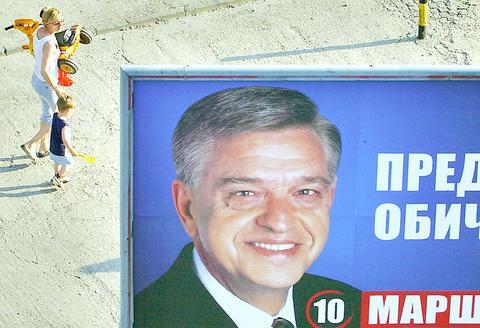A hardline Serbian nationalist mistrusted by the West was expected to take the lead yesterday in a presidential election that could bring down the government of Prime Minister Vojislav Kostunica.
But acting chief Tomislav Nikolic of the Radical Party, formally headed by war crimes suspect Vojislav Seselj from behind bars in The Hague, is unlikely to win outright and may face a tight contest in a run-off in two weeks.
Diplomats have warned a Nikolic victory would be bad for impoverished Serbia and would risk scaring away foreign investors, even though he has toned down his ultra-nationalist rhetoric and the office's powers are limited.

PHOTO: AP
Pro-Western reformer Boris Tadic of the Democratic Party, like the Radicals now in opposition, is tipped to follow Nikolic into a second round that would be held on June 27. Kostunica ally Dragan Marsicanin has been trailing them in opinion polls.
A victory for Nikolic would likely spell trouble for Kostunica's three-month-old minority coalition as the liberal G-17 party has threatened to quit if he becomes head of state.
The Radicals oppose handing over suspects to the war crimes tribunal in The Hague, a key condition for closer ties with the EU, the wealthy club Serbia hopes to join one day.
Seselj is an old ally of former president Slobodan Milosevic and like him is accused of atrocities in the 1990s Balkan wars.
His party, which also came first in December's parliamentary poll but failed to get into power, has benefited from widespread disappointment with the Western-style economic and political reforms pushed through since Milosevic's overthrow in 2000.
"I voted for Nikolic because I always vote against the authorities," said Vojislav Stojanovic, a 64-year-old mathematics teacher, after he cast his ballot in the capital.
Student Ana Milkovic said the hardline leader would drag the country backward. She said Tadic was the only candidate who could continue the reformist work of Prime Minister Zoran Djindjic, assassinated by suspected crime gang bosses last year.
"The first thing I expect the president to do is to improve the economy and our standards of living," the 24-year-old said.
Serbia has been without an elected head of state since president Milan Milutinovic, also indicted by the war crimes tribunal, stepped down when his term expired in January last year. Milutinovic subsequently surrendered to the tribunal.
Three previous attempts to pick a successor failed because voter turnout fell short of the required 50 percent, including one in November in which Nikolic came out ahead. But that rule has since been scrapped.
Surveys published this week gave Nikolic 29 percent backing and Tadic around 23 percent. Business tycoon Bogoljub Karic was running third ahead of Marsicanin in some opinion polls.
But they also forecast that Tadic would win against Nikolic in a run-off as he was likely to pick up more votes from supporters of defeated candidates.
Failure by Marsicanin to enter the second round would be a major setback for Kostunica, a conservative who helped oust Milosevic but whose government relies on the parliamentary support of the former strongman's Socialist Party.

Philippine President Ferdinand Marcos Jr yesterday vowed that those behind bogus flood control projects would be arrested before Christmas, days after deadly back-to-back typhoons left swathes of the country underwater. Scores of construction firm owners, government officials and lawmakers — including Marcos’ cousin congressman — have been accused of pocketing funds for substandard or so-called “ghost” infrastructure projects. The Philippine Department of Finance has estimated the nation’s economy lost up to 118.5 billion pesos (US$2 billion) since 2023 due to corruption in flood control projects. Criminal cases against most of the people implicated are nearly complete, Marcos told reporters. “We don’t file cases for

A feud has broken out between the top leaders of the far-right Alternative for Germany (AfD) party on whether to maintain close ties with Russia. The AfD leader Alice Weidel this week slammed planned visits to Russia by some party lawmakers, while coleader Tino Chrupalla voiced a defense of Russian President Vladimir Putin. The unusual split comes at a time when mainstream politicians have accused the anti-immigration AfD of acting as stooges for the Kremlin and even spying for Russia. The row has also erupted in a year in which the AfD is flying high, often polling above the record 20 percent it

Ecuadorans are today to vote on whether to allow the return of foreign military bases and the drafting of a new constitution that could give the country’s president more power. Voters are to decide on the presence of foreign military bases, which have been banned on Ecuadoran soil since 2008. A “yes” vote would likely bring the return of the US military to the Manta air base on the Pacific coast — once a hub for US anti-drug operations. Other questions concern ending public funding for political parties, reducing the number of lawmakers and creating an elected body that would

‘ATTACK ON CIVILIZATION’: The culture ministry released drawings of six missing statues representing the Roman goddess of Venus, the tallest of which was 40cm Investigators believe that the theft of several ancient statues dating back to the Roman era from Syria’s national museum was likely the work of an individual, not an organized gang, officials said on Wednesday. The National Museum of Damascus was closed after the heist was discovered early on Monday. The museum had reopened in January as the country recovers from a 14-year civil war and the fall of the 54-year al-Assad dynasty last year. On Wednesday, a security vehicle was parked outside the main gate of the museum in central Damascus while security guards stood nearby. People were not allowed in because